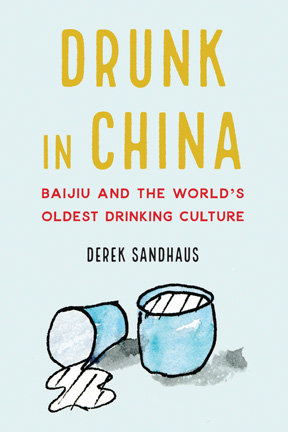
If you like trying new liquors, here’s one for you — baijiu (pronounced BAI-jo or BAI-gio). China’s most famous liquor has been around for centuries, but is almost unheard of outside of China.
Over the last three to five years, Derek Sandhaus has set out to change that, teaming up with experts who have worked to educate people in other countries, or non-Chinese people within China, about Chinese alcohol. He has learned what the difference is between the various types of baijiu, how to appreciate and understand it, and incorporate it into a more international setting.
The 36-year-old and his three partners created a company called Ming River, and last year, after a couple of years of development, Ming River was launched in New York and Berlin. It has been expanding rapidly, Sandhaus said. In the United States Ming River is available in California, New Jersey and Illinois. It is available in Germany, Switzerland, Austria, Denmark and soon in Italy, and has expanded into Hong Kong, Indonesia, Singapore and possibly Thailand.
Ming River recently signed a contract with the Kansas City, Missouri, company Vintegrity, which distributes spirits in Kansas and Missouri. Sandhaus said the product will likely be on the market here in some liquor stores and bars by January.
Baijiu is made differently in various parts of China, but what they all have in common is that they’re distilled from grain. Sorghum is the most popular, but baijiu is also made with rice, wheat, corn and millet.
“The major distinction between baijiu and Northwestern liquors is that it’s fermented and distilled in a solid rather than a liquid form, using a complicated fermentation process that uses wild yeasts, molds and bacterium to break down the grains and then steam the alcohol out of them,” Sandhaus explained. “In China they use the term baijiu pretty much interchangeably with spirits, so anything they make is called baijiu, but it’s the most popular category of spirits.”
Sandhaus said every year China distills, sells and probably consumes about 9 billion liters of baijiu — an amount in terms of volume that’s greater than the global sales of whiskey and vodka combined.
“It’s an extraordinarily large amount of alcohol they’re producing but almost all of it is consumed in China; very little of it is actually exported,” he said. “One thing that attracted me to it originally is that it’s very pungent and flavorful. It’s usually bottled at very high strengths like 105 to 110 proof and most people not from China who encounter this are put off by it a little bit. In addition to being quite strong, it has a flavor that’s very distinctive and quite different from what most people are used to drinking.”
Sandhaus said some of the reasons baijiu has remained a mystery in the Western world are the flavor of the drink, which is probably more associated with indigenous Chinese food than with anything most people in the West are used to; the method of consumption; and the cultural element.
“In China liquor is always consumed neat with food. Much like we pair wine with our dinner, they always pair baijiu with their dinners,” he said. “There’s a certain peer pressure element to drinking in China where you can go through several bottles over the course of a meal.”
Sandhaus said the way baijiu is consumed can be fun and enjoyable, the same way you drink sake at a Japanese restaurant or ouzo at a Greek restaurant.
He said there are three factors that will enable baijiu to be accepted in the Western world: exposure, education and familiarity.
“We are lucky we live in a period where the appetite and options for trying international foods and flavors are expanding rapidly,” he said. “As people gain an appreciation and understanding for new flavors, baijiu is really going to take off because it has these very traditional, funky fermented flavors that you get out of traditional East Asian foods that you’re not going to find at Panda Express.
“I think a path it can follow and emulate is agave-based Mexican spirits like tequila and mescal. … You have to go from being something strange to something that’s strangely familiar to being something that’s just familiar and accepted.”
Sandhaus grew up attending Congregation Beth Torah. He has published four books on Chinese history and culture, serves as Ming River’s baijiu education director and as the editor at drinkbaijiu.com. He lives with his wife and dog in Jerusalem.

‘Drunk in China’
Derek Sandhaus will launch his new book, “Drunk in China: Baijiu and the World’s Oldest Drinking Culture,” at 7 p.m. Tuesday, Nov. 19, at The Raven Book Store, 6 E. 7th St., Lawrence, Kansas.


